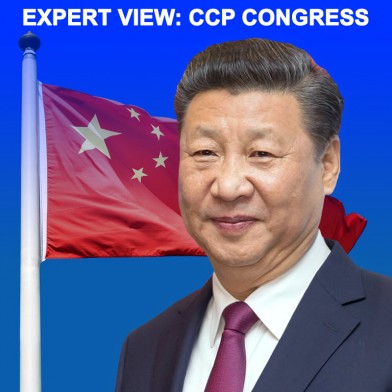The 19th National Congress of the Chinese Communist Party (CCP) – an event that happens only every five years – begins on Wednesday (18 October).
China's leadership will be selected at the five-day event, which will be attended by 2287 delegates from around China.
About 200 members will be selected to form the Central Committee, of which the seven top-ranked members will make up the Politburo Standing Committee, the party's highest ruling body.
Significant points about the Congress
Leadership: The 19th National Congress is being viewed as a referendum on the influence and power of President Xi Jinping, who is widely expected to serve a second term as the General Secretary.
Power in the CCP has been described to be "more concentrated around a single leader than at any point in the last 40 years", and there is speculation Xi will remain in power after his two-term limit as President is up.
Xi's ideas: A big sign of Xi’s influence would be if his ideas – such as the "Four Comprehensives" plan, or four economic strategies to achieve the China Dream – are added to the Party’s constitution. There have only been two occasions where this has happened, with the “Mao Zedong Thought” and “Deng Xiaoping Theory”.
How the new ideas conceptualise China’s view of its role in the world is central to understanding Chinese foreign policy over the next few years, says a China expert.
Succession: According to a 2002 age rule, party members aged 68 or older must retire.
The rule, however, is not set in stone. If this precedent is upheld, it would mean a major change in the makeup of the Party’s core leadership – five of the seven Politburo Standing Committee members are of retirement age.
If the rule is not followed, it would signal a path for Xi to hold on to power, given that he will be 69 by the next party congress.
Issues at stake
New members of the core leadership will face the range of opportunities and challenges that will emerge with China’s rise as a global power. However, with Xi still at the helm, there is likely to be policy continuity, with a focus on internal stability. The biggest issues are:
- Anti-corruption efforts
- Belt and Road Initiative
- The China Dream
- Reform of state-owned enterprises (SOEs)
- Economic reform and capital controls
- Debt
- Political and social control
- Demographic change
- Security issues (South China Sea, border disputes, North Korea)
- Taiwan
- Xinjiang and Tibet
- Environmental issues
Stability measures taken in lead-up to congress
Xi and the party have prioritised stability in the year leading up to the congress.
This has led to stricter censorship and self-censorship on forms of communication and media, including chat groups, social media, virtual private networks (VPNs), and more traditional media.
Other measures to ensure a positive atmosphere include additional checks on migrants, relative quiet on security issues such as the South China Sea dispute, increased border security, and the expulsion of CCP members found guilty in the anti-corruption drive.
Ongoing tensions with North Korea have also been a source of concern ahead of the congress
Big names in the core leadership

The bigwigs in the Chinese Communist Party.
The party’s leadership is dominated by ethnically Han men. Representation of other ethnicities remains tokenistic at just seven of the 205 current Central Committee members. Only 10 women are members of that committee. The Politburo Standing Committee (PSC) has never included a woman.
- Li Keqiang: The current Premier. He is expected to remain in his current position. Any change would be seen as highly significant.
- Wang Qishan: Secretary of the Central Commission for Discipline Inspection, the CCP's anti-corruption body. He turned 69 in July, and will retire unless the precedent is overturned.
- Chen Min’er: Party Scretary of the Chongqing region and a Xi protege. He is expected to be promoted into the 25-member Politburo.
Read more:
ASIA MEDIA CENTRE
- Jason Young: Xi Jinping's ideas likely to dominate policy
- Xiang Gao: 19th Congress will set tone for economic direction
- Stephen Noakes: Will Xi Jinping rewrite power transition rules?
AGENCIES
- Bloomberg: 'China Communist Party expels former rising star'
- China Daily: Opinion: 'Four Comprehensives' light up the future
- East Asia Forum: Opinion: Tackling China’s demographic challenges
- National Bureau of Asian Research: Political and strategic implications of BRI
- SCMP: Xi on track to achieve first ‘centennial goal’ in his second five-year term
- SCMP: Guess what Chinese travellers are bringing back home? VPNs, lots of them
- SCMP: China steps up security on N Korea, India, Myanmar borders for Party congress
- SupChina: Opinion: The dire state of female representation in the Chinese government
- The Japan Times: China to amend party constitution at October congress, possibly to enshrine Xi’s ‘Comprehensives’
- The Straits Times: Opinion: Deceptive lull in South China Sea
– Asia Media Centre
